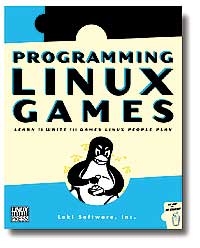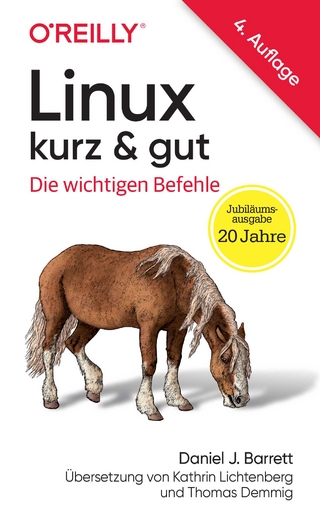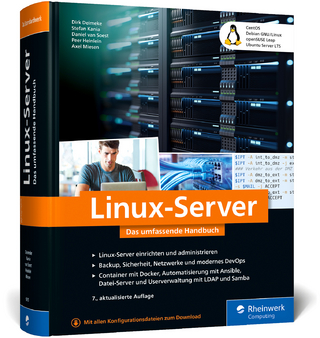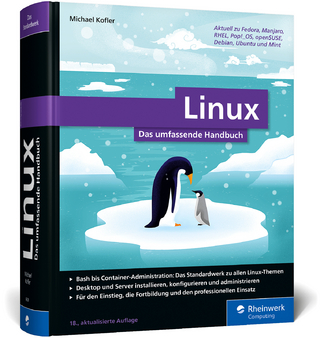
Programming Linux Games
No Starch Press,US (Verlag)
978-1-886411-49-4 (ISBN)
- Titel ist leider vergriffen;
keine Neuauflage - Artikel merken
Programming Linux Games Table Of Contents Contents Foreword Preface Who This Book Is For Acknowledgements 1 The Anatomy of a Game A Quick Survey of Game Genres Simulation Games First-Person Shooters Real-time Strategy Games Turn-based Strategy Games Role-playing Games Puzzle Games Multi User Dungeons A Quick Look Under the Hood The Input Subsystem The Display Subsystem The Audio Subsystem The Network Subsystem The Update Subsystem The Game Loop 2 Linux Development Tools Programming Editors vi Emacs NEdit Compiling Programs Under Linux Using The Make Utility Creating Makefiles Error Handling Working with Libraries Static Libraries Shared Libraries Linux Linker Quirks Debugging Linux Applications Compiling for Debugging gdb ddd Bug Tracking Project Management with CVS A Brief Tutorial on CVS Other Useful Tools Rapid Text Searching with grep Updating Source with di_ and patch 3 Linux Gaming APIs Graphics APIs SVGALib GGI SDL ClanLib OpenGL Plib Glide Xlib Graphical User Interface Toolkits GTK+ Tk Fltk Qt SDL GUI support Audio APIs OSS ALSA ESD OpenAL Scripting Libraries Tcl Guile and MzScheme Python and Perl Networking APIs BSD Sockets OpenPlay IPX and SPX File Handling libpng and libjpeg libaudiofile and libsndfile Ogg Vorbis The SDL MPEG Library, SMPEG zlib 4 Mastering SDL Computer Graphics Hardware The Framebuffer The SDL Video API Setting up the Display Direct Surface Drawing Drawing With Blits Colorkeys And Transparency Loading Other Image Formats Alpha Blending Achieving Smooth Animation with SDL Input and Event Processing Processing Mouse Events Processing Keyboard Events Processing Joystick Events Multithreading with SDL SDL Audio Programming Representing Sound with PCM Feeding a Sound Card An Example of SDL Audio Playback Integrating OpenGL with SDL Penguin Warrior Creating Graphics Implementing a Parallaxing Scroller in SDL A Simple Particle System Game Timing 5 Linux Audio Programming Competing APIs Introducing Multi-Play Loading Sound Files Using libsndfile Other Options Using OSS Reality Check Achieving Higher Performance with Direct DMA Buffer Access Playing Sound with ALSA Sharing the Sound Card with ESD Building Multi-Play Environmental Audio with OpenAL OpenAL Basics Adding Environmental Audio to Penguin Warrior Implementing Game Music with Ogg Vorbis Working with Vorbis Files Adding Music to Penguin Warrior 6 Game Scripting Under Linux A Crash Course in Tcl Built-in Tcl Commands Interfacing Tcl with C Linking Against Tcl Executing Scripts Understanding Commands and Objects A Simple Scripting Engine Designing a Game Script Applying Scripting to the Real World Single Versus Multiple Contexts Can We Trust the Script? Script Performance Who's Writing the Script? 7 Networked Gaming with Linux 'Tis a Big Net, Quoth the Raven Internet Protocols Addresses and Ports Name Resolution Socket Programming 101 Sockets Connecting TCP Sockets Receiving TCP Connections Working with UDP Sockets Multiplayer Penguin Warrior Network Gaming Models Penguin Warrior's Networking System Network Game Performance Security Issues 8 Gaming with the Linux Console Pros and Cons of the Linux Framebuffer Setting Up a Framebuffer Device A First Foray into Framebuffer Programming Setting Framebuffer Video Modes How Video Scanning Works The Mode Database An Example Use the Source, Luke! Console Input Handling Keyboard Input from a Terminal Mouse Input with GPM 9 Finishing Penguin Warrior Adding Weapons Drawing Phasers Detecting Phaser Hits Imposing a Sane Rate of Fire Creating Status Displays In Retrospect 10 To Every Man a Linux Distribution Source or Binary? Local Configuration Linux Isn't Alone: Supporting FreeBSD Packaging Systems Graphical Installation Goodness: Loki's Setup Program Understanding The Linux Filesystem Standard Glossary of Terms Bibliography
| Erscheint lt. Verlag | 1.9.2001 |
|---|---|
| Verlagsort | San Francisco |
| Sprache | englisch |
| Einbandart | Paperback |
| Themenwelt | Informatik ► Betriebssysteme / Server ► Unix / Linux |
| Mathematik / Informatik ► Informatik ► Netzwerke | |
| Mathematik / Informatik ► Informatik ► Programmiersprachen / -werkzeuge | |
| Informatik ► Weitere Themen ► Computerspiele | |
| ISBN-10 | 1-886411-49-2 / 1886411492 |
| ISBN-13 | 978-1-886411-49-4 / 9781886411494 |
| Zustand | Neuware |
| Haben Sie eine Frage zum Produkt? |
aus dem Bereich


